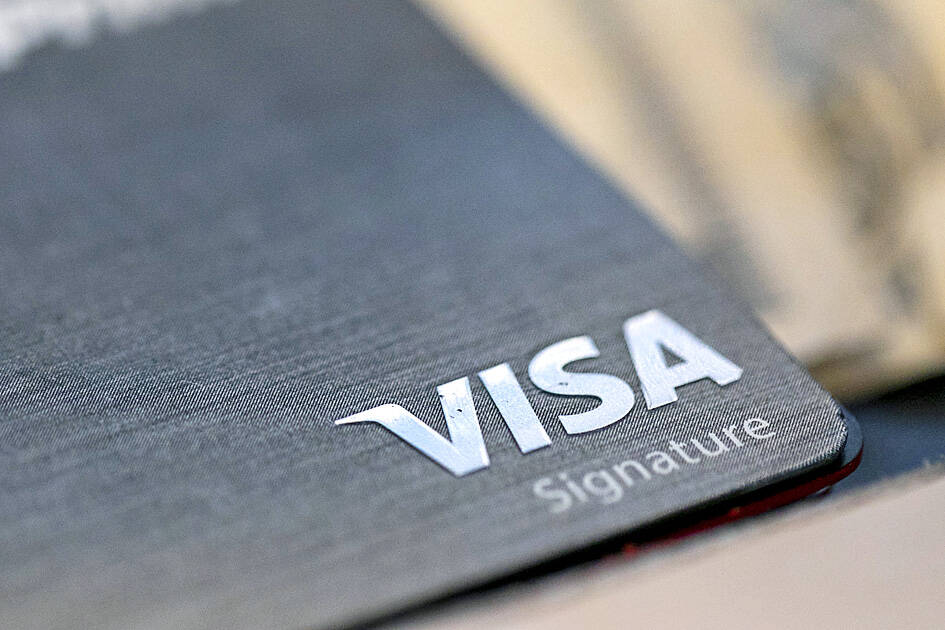X is teaming up with Visa Inc to soon offer a system for real-time payments on the social media platform — signaling some progress in a years-long vision from billionaire owner Elon Musk to create an “everything app.”
Visa is the first partner for the platform’s “X Money Account” service, which is set to launch later this year, X CEO Linda Yaccarino said in a Tuesday post announcing the news.
The offering, Yaccarino said, will support an in-platform digital wallet and peer-to-peer payments connected to users’ debit cards, with an option to transfer funds to a bank account.

Photo: AP
According to Visa, these services will be powered by Visa Direct — the payment giant’s instant money transferring service — and will be available to X Money Account users in the US.
Whether X Money will become available to consumers in other countries, and perhaps through additional payment partners, in the near future is still known. An exact date for the US launch has also not been announced yet.
In her post, Yaccarino called the partnership with Visa a “milestone for the Everything App” and the “first of many big announcements about X Money this year.”
Musk has long expressed interest in creating his own version of something similar to China’s WeChat (微信) — a “super app” that does video chats, messaging, streaming and payments.
However, the landscape is far more competitive today — with a handful of companies making similar efforts to expand their in-platform offerings.
Other social media giants, such as Facebook parent Meta Platforms Inc, have added shopping, games and even dating features.
Consumers now have different platforms at their disposal for communications, payment services, entertainment and more.
How X’s coming “everything” features will fare has yet to be seen. Since Musk’s 2022 takeover of Twitter Inc, the platform has already alienated many users and advertisers over reports of rising hate speech and misinformation.
X’s ambitions could also thrust the company into the crosshairs of other powerful tech giants trying to fend off a perceived competitive threat.
US regulators have alleged that Apple Inc, for example, has been illegally using its market power to stifle so-called super apps from making their way onto its iPhone since 2017.
As part of an antitrust lawsuit filed last year, the US Department of Justice said it had uncovered evidence showing that Apple believed a super app would lessen consumers’ usage of the iPhone’s own software and services, including payment processing. The Cupertino, California, company has vehemently denied the allegations and is trying to persuade a federal judge in New Jersey to dismiss the entire case.

Hon Hai Precision Industry Co (鴻海精密) yesterday said that its research institute has launched its first advanced artificial intelligence (AI) large language model (LLM) using traditional Chinese, with technology assistance from Nvidia Corp. Hon Hai, also known as Foxconn Technology Group (富士康科技集團), said the LLM, FoxBrain, is expected to improve its data analysis capabilities for smart manufacturing, and electric vehicle and smart city development. An LLM is a type of AI trained on vast amounts of text data and uses deep learning techniques, particularly neural networks, to process and generate language. They are essential for building and improving AI-powered servers. Nvidia provided assistance

DOMESTIC SUPPLY: The probe comes as Donald Trump has called for the repeal of the US$52.7 billion CHIPS and Science Act, which the US Congress passed in 2022 The Office of the US Trade Representative is to hold a hearing tomorrow into older Chinese-made “legacy” semiconductors that could heap more US tariffs on chips from China that power everyday goods from cars to washing machines to telecoms equipment. The probe, which began during former US president Joe Biden’s tenure in December last year, aims to protect US and other semiconductor producers from China’s massive state-driven buildup of domestic chip supply. A 50 percent US tariff on Chinese semiconductors began on Jan. 1. Legacy chips use older manufacturing processes introduced more than a decade ago and are often far simpler than

STILL HOPEFUL: Delayed payment of NT$5.35 billion from an Indian server client sent its earnings plunging last year, but the firm expects a gradual pickup ahead Asustek Computer Inc (華碩), the world’s No. 5 PC vendor, yesterday reported an 87 percent slump in net profit for last year, dragged by a massive overdue payment from an Indian cloud service provider. The Indian customer has delayed payment totaling NT$5.35 billion (US$162.7 million), Asustek chief financial officer Nick Wu (吳長榮) told an online earnings conference. Asustek shipped servers to India between April and June last year. The customer told Asustek that it is launching multiple fundraising projects and expected to repay the debt in the short term, Wu said. The Indian customer accounted for less than 10 percent to Asustek’s

Gasoline and diesel prices this week are to decrease NT$0.5 and NT$1 per liter respectively as international crude prices continued to fall last week, CPC Corp, Taiwan (CPC, 台灣中油) and Formosa Petrochemical Corp (台塑石化) said yesterday. Effective today, gasoline prices at CPC and Formosa stations are to decrease to NT$29.2, NT$30.7 and NT$32.7 per liter for 92, 95 and 98-octane unleaded gasoline respectively, while premium diesel is to cost NT$27.9 per liter at CPC stations and NT$27.7 at Formosa pumps, the companies said in separate statements. Global crude oil prices dropped last week after the eight OPEC+ members said they would